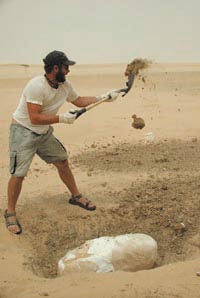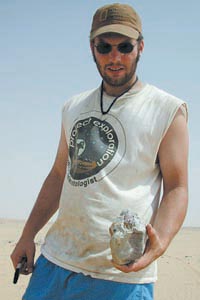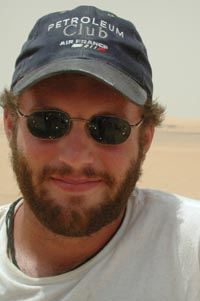Fourth-year searching for dinosaur fossils on Saharan expedition
 |
How did you get involved with the expedition?
I have worked for Paul Sereno in his dinosaur preparation laboratory, preparing fossils of dinosaurs, crocodiles and pterosaurs. I also have spent a lot of time casting and molding fossils. After working in the lab over a year and a half, I was invited to join the 2000 Expedition to Niger.
Have your experiences there been different from what you had expected?
We have spent a lot of time in towns in the area, which has been a real eye-opening experience. Walking through open-air markets, bargaining for silver and even being able to experience cultural events, such as the Cure Salee (a nomadic festival called the Salt Festival), have all added to my experience thus far.
Where are you living?
 David Blackburn, a fourth-year in the College, examines a fossil he recently found while accompanying Paul Sereno, Professor in Organismal Biology & Anatomy, on his current expedition in the Sahara Desert. |
Has language been a barrier to performing the work there?
It’s not completely necessary to know another language, but my little knowledge of French definitely comes in handy. I’ve also picked up words in Tomacheck and Hausa, two of the local languages.
What is a typical day like?
I wake up at 5:30 a.m. and put my cot and sleeping clothes away. Most of the camp gets up around 6:15 a.m. We gather all of our supplies for collecting fossils and then we’re on our way out to sites by 7:30 a.m. or so. We work at collecting or prospecting for fossils until 12:30 p.m. We take about an hour and a half break, and then we continue working until the sun sets at around 6:15 p.m. We return to camp, eat dinner, debrief about the day, and then most of the camp is out on the dunes asleep by 9 p.m. Then we wake up and do it all again!
What is the most challenging part of being in Niger?
We don’t really have any opportunity to communicate with family and friends. Some people might think the hardest part is working all day in heat that can reach up to 130 degrees Fahrenheit, but if you enjoy the work and the people with whom you’re working, it is extremely enjoyable!
What’s your favorite memory so far?
 David Blackburn |
Is there anything you’d like to add about your experience?
Being that paleontology is what I would like to pursue as a career, this is truly an amazing experience. However, I have to recommend doing some sort of field research to anyone because it really allows one to gain a whole new perspective on academia and research. And it’s fun!
![[Chronicle]](/images/small-header.gif)